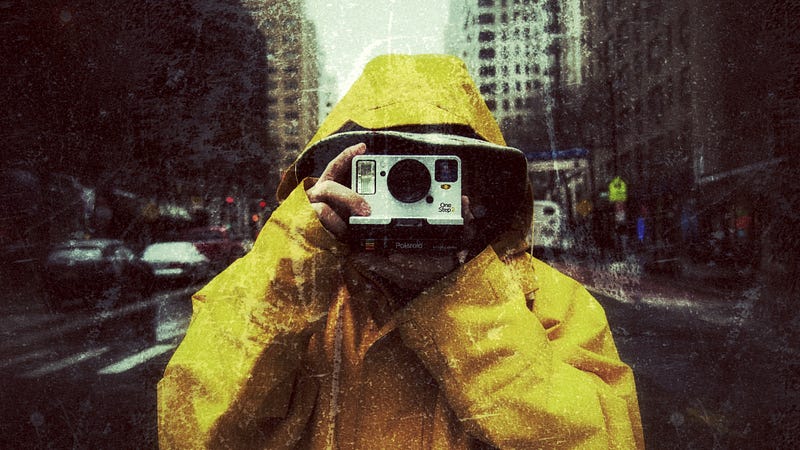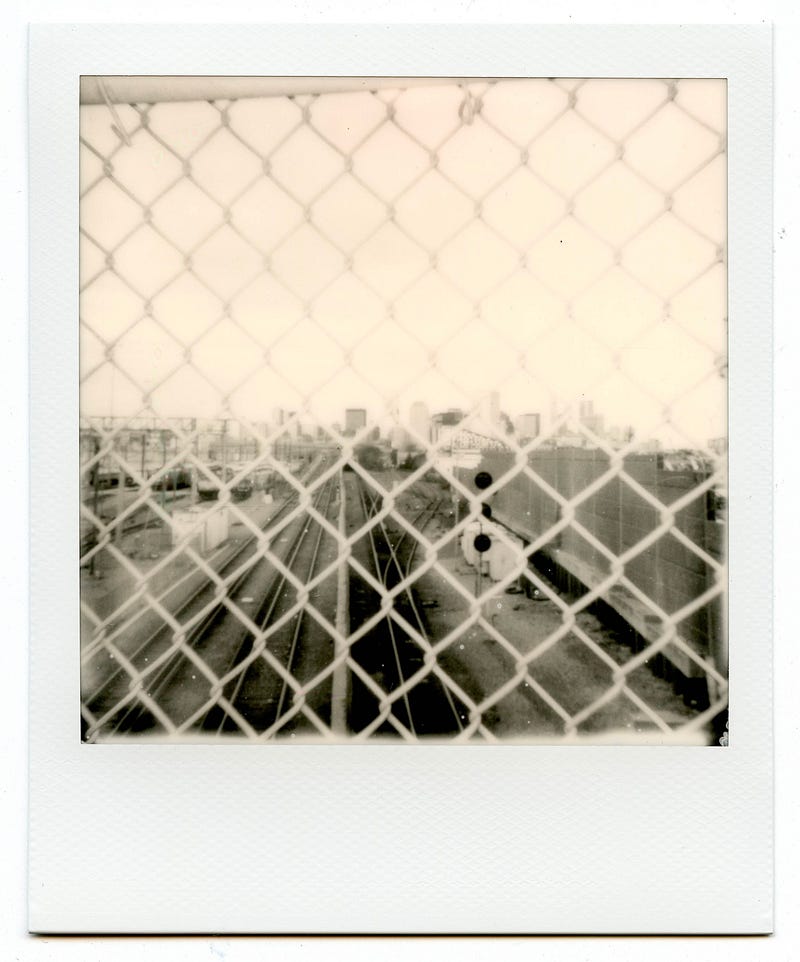# Reflecting on the Writing Journey: A Polaroid of Memories
Written on
Chapter 1: The Writer's Lens
What will you retain as the world speeds toward an uncertain future?

“There is a crack in everything. That’s how the light gets in.” — Leonard Cohen
One of the delights of possessing a writer’s perspective is that every experience—positive, negative, or neutral—transforms into a wellspring of insights, narratives, and reflections. However, the challenge lies in the inability to distinguish between the good and the bad, as everything floods in simultaneously, akin to trying to sip water from a firehose aimed directly at you.
Regrettably, I must inform you that the outlook appears bleak from my vantage point. Storm clouds are gathering as anticipated, and I see scant evidence of hope amidst the chaos. It feels more like the four horsemen of the apocalypse are galloping through the storm, eager for destruction, which is only slightly more dramatic and considerably less hopeful.
Canada is ablaze. Texas is sweltering. Vermont is submerged. California seems destined to plunge into the ocean, and if justice exists, Florida may one day drift away in a fit of rage.
The threat of global pandemics evolving into endemic diseases looms. The automation of jobs and their transfer to developing nations heralds a future where profits accrue to a select few while the majority face unemployment. Artificial Intelligence, after draining us of joy, will complete the job initiated by machines.
Religious extremism is proliferating at a rate almost as rapid as the rise of atheism, leading to the emergence of theocratic fascism, while a small group of predominantly white men controls 90% of global wealth. The trends seem to spiral downward without respite.
There’s little to anticipate with optimism.
Sadly, I lack a silver lining for any of this. I wish I could offer one. It seems we’re in for a rough period, likely extending well beyond my own time. Consequently, I’ve devised a new approach to cope as best as I can. I can’t tackle these monumental issues single-handedly. I’m uncertain whether they can even be resolved. My focus will be on my reactions to the challenges we face. Tired of feeling defeated, I’m opting for a fresh perspective.
I intend to embrace what remains and make the most of it.
“Shake it like a Polaroid picture, hey ya.” — André 3000

Collecting Polaroids
As a photographer, I’ve always found the term “capture” to be quite off-putting. People often use it to commend a photograph, implying that the image was merely a fortuitous moment rather than the result of skill and effort. This notion is deeply insulting, akin to suggesting that a professional merely stumbled upon a remarkable photo, much like how amateurs take snapshots, hoping for a stroke of luck.
The distinction between a crafted photograph and a mere capture is significant. Amateurs may take quick shots, but there’s an authenticity and emotion in an unposed moment that a seasoned photographer might not replicate.
In my youth, photography felt like a blend of artistry and science—an intricate process that transformed images into tangible forms, usually retrieved after several weeks from a photo booth. We also had a more immediate, albeit less refined, option: the Polaroid camera.
Polaroid cameras utilized unique film that processed images instantly. You’d take a picture, extract the film, and peel it away, revealing an image within a minute—almost magical. While the quality was often subpar, these pictures offered an immediacy that traditional photography lacked.
Two cultural references spring to mind: Cameron Crowe’s 2005 film Elizabethtown and a wedding episode from the American version of The Office, where female characters mime taking mental Polaroids to preserve moments.
In Elizabethtown, Drew observes, “I have recently become a secret connoisseur of last looks. You know the way people look at you when they believe it’s for the last time…?” This idea resonates deeply with my current life approach.
I’m not typically this pessimistic, and I certainly don’t intend to surrender just yet. We must persist in our efforts to protect the planet, democracy, and the American Dream, yet I find myself seeking a side pursuit that brings me solace.
I yearn for that silver lining.

Last Looks
I have a theory regarding photographs, particularly those of individuals who have passed. Once someone dies, their image undergoes a transformation. Initially, it’s merely a snapshot of a friend or a recently departed loved one—an instant frozen in pixels. But after their death, that moment becomes all you have left, encased in time like a relic.
Joni Mitchell’s 1970 song “Big Yellow Taxi” encapsulates this sentiment. She laments, “They paved paradise, put up a parking lot,” expressing the idea that we often fail to appreciate what we have until it's lost.
At first glance, her song seems a warning about environmental fragility, but it soon becomes personal, highlighting loss in a way that resonates deeply with listeners.
“It’s true. We don’t know how good we have it until what we have is gone, as we watch the taxi’s taillights fade into the night.”
Recognizing significant moments is challenging; we rarely understand what will leave a lasting impression until it’s too late. In hindsight, we might identify pivotal moments, but they often slip by unnoticed.
Given our inability to foresee the future, we must express gratitude for the beauty that surrounds us today. How long until our world undergoes irrevocable changes, where we no longer relish the things we once took for granted? The clean air, abundant water, sunlit days, thriving forests, and diverse marine life—how long before they become mere memories, akin to a tree museum we visit with our grandchildren?
I’ve largely stepped back from photography as a personal outlet. While I still capture moments of my grandchildren or culinary creations with my phone, the effort of using professional gear feels increasingly futile. What I now propose are mental snapshots—deliberate acknowledgments of life’s fleeting beauty that we tend to overlook.
With the Canadian wildfires this summer, there were days when masks became necessary outdoors due to poor air quality. It made me ponder how long it would be before this becomes a routine necessity. How long before we can’t enjoy the outdoors without protection?
We’re already experiencing a significant decline in biodiversity. Just recently, the water temperature off Key West hit 98º. The planet is unraveling at an alarming rate.
How will we memorialize these experiences? Who will preserve our collective memories?

Playing Us Out
Recently, I wrote about the imagery of Nero playing the violin as Rome burned in 64 AD. Although the violin didn’t exist then, it serves as a poignant metaphor—just like the musicians aboard the Titanic who played as it sank. Someone must accompany us as we exit the stage.
Art offers a remedy—writing, painting, photography, music, theater, film, and storytelling allow us to document our existence. It captures not just our actions or thoughts but also our emotions, making the ephemeral tangible through narratives.
My contribution lies in storytelling, aiming to encapsulate the experiences of a man living in early 21st-century North America. What was life like? What did it sound, feel, and smell like? I don’t need to pen “History of the World, Part III.” I simply wish to share my affection for sweet corn, dolphins, blue skies, and the beauty of nature.
We can no longer take for granted that tomorrow will mirror today. It’s imperative to begin documenting our experiences for future generations.
Click. Scribble, scribble. Save.
As Michael, the character portrayed by John Travolta in the 1996 comedy, once said, “I’m going to miss everything so much.”
If you enjoyed this piece, click to follow more writings by David Todd McCarty. Consider subscribing to read all of David's articles for free, along with the work of many other talented writers. Follow David Todd McCarty on Mastodon.